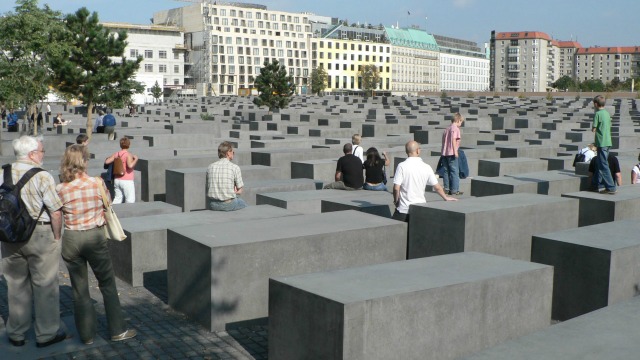Have We Learned the Lessons — and Causes — of the Holocaust?
 by Manfred Gerstenfeld
by Manfred Gerstenfeld
This coming Friday is International Holocaust Remembrance Day. It is often assumed that the Holocaust was caused by a long-lasting antisemitic infrastructure in Germany and on the European continent. According to this theory, many centuries of demonization of the Jews created an atmosphere that made it possible for the Nazis to commit genocide against the Jews.
Over the course of centuries, Christianity systematically demonized the Jews. This demonization began in Roman Catholic theology. A major role was played by Voltaire and other French enlightenment philosophers. They were followed by German idealists and other philosophers, as well as 19th century French socialists and Karl Marx. Many others joined this movement of hate in the late 19th and early 20th century. Even after the Holocaust, Europe’s main philosopher was the German antisemite and former Nazi, Martin Heidegger.
But these explanations of the Holocaust may not be so simple.
In 2015, Anglican Archbishop Justin Welby remarked that antisemitism is a complex and difficult subject, adding that it is still deeply embedded “in our history and culture in Western Europe.” British-Polish sociologist Zygmunt Bauman, who recently passed away, claimed that there is a far more opaque infrastructure for the Holocaust than mentioned before. In his book, Modernity and the Holocaust, he links the great genocide to structural elements of modern society. He states that the Holocaust was a product of men educated in the most refined culture of Western society, and thus a product of Western civilization. In Bauman’s view, the conditions for a similar event to occur are still in place.
As an aside, Bauman’s insights did not prevent him from making contemporary Holocaust-distorting observations. In an interview with the Polish weekly Politika, he compared the Israeli separation fence to the walls surrounding the Warsaw Ghetto.
The question as to whether a second Holocaust is possible was the subject of a debate in 2002. American columnist Ron Rosenbaum claimed that it was likely that, sooner or later, a nuclear weapon would be detonated by Arab fundamentalists in Tel Aviv. This led to a reaction by Leon Wieseltier, who said that the Jews had found both safety and strength after the war, and that a second Holocaust would not occur. Rosenbaum countered by claiming that Wieseltier was fleeing into denial, as there were many Hitler-like figures who were demonizing Jews in the Arab world. Furthermore, in recent decades, we have seen genocides elsewhere, the best known in Cambodia and Rwanda.
All this raises the question as to what the history of the Holocaust means for today.
In contemporary society, there are many demonizers of Jews and in particular of Israel. This is a multilayered process. At the forefront of this movement are forces from the Muslim world. Iranian rulers have often mentioned that Israel will be wiped off the map. Others include Muslim terror organizations such as Hamas and Hezbollah, as well as countless individuals. Their de facto allies include a broad range of demonizers of Israel who knowingly ignore genocidal and demonizing tendencies in the Arab world. Some examples of these are the UN and associated bodies, assorted NGOs, various European socialist parties, many pseudo-progressive academics, numerous trade unionists and so on.
All the above can only lead to one conclusion: It is incumbent upon Israel and the Jewish world to make a huge effort to map how all of this hangs together. Only once we understand the arrangement of our enemies on the battleground can we fight them effectively.
 Iran Sentences Rapper Toomaj Salehi to Death Over 2022-23 Unrest
Iran Sentences Rapper Toomaj Salehi to Death Over 2022-23 Unrest Netanyahu: ‘Antisemitic Mobs Have Taken Over Leading U.S. Universities’
Netanyahu: ‘Antisemitic Mobs Have Taken Over Leading U.S. Universities’ U.S. Decides Against Sanctions on IDF’s Netzah Yehuda Battalion
U.S. Decides Against Sanctions on IDF’s Netzah Yehuda Battalion Israel Says It Is Poised to Move on Rafah
Israel Says It Is Poised to Move on Rafah Israeli Hostage Hersh Goldberg-Polin Seen Alive in a New Hamas Video
Israeli Hostage Hersh Goldberg-Polin Seen Alive in a New Hamas Video Palestinian Prime Minister Announces New Reform Package
Palestinian Prime Minister Announces New Reform Package France: Man Suspected of Abducting, Raping Jewish Woman ‘to Avenge Palestine’
France: Man Suspected of Abducting, Raping Jewish Woman ‘to Avenge Palestine’ Israel Intensifies Strikes Across Gaza, Orders New Evacuations in North
Israel Intensifies Strikes Across Gaza, Orders New Evacuations in North Iran Threatens to Annihilate Israel Should It Launch a Major Attack
Iran Threatens to Annihilate Israel Should It Launch a Major Attack ‘Completely Baseless’: Reports of Mass Graves at Gaza Hospitals are False, IDF Says
‘Completely Baseless’: Reports of Mass Graves at Gaza Hospitals are False, IDF Says




 Israeli Hostage Hersh Goldberg-Polin Seen Alive in a New Hamas Video
Israeli Hostage Hersh Goldberg-Polin Seen Alive in a New Hamas Video Israel Says It Is Poised to Move on Rafah
Israel Says It Is Poised to Move on Rafah U.S. Decides Against Sanctions on IDF’s Netzah Yehuda Battalion
U.S. Decides Against Sanctions on IDF’s Netzah Yehuda Battalion Netanyahu: ‘Antisemitic Mobs Have Taken Over Leading U.S. Universities’
Netanyahu: ‘Antisemitic Mobs Have Taken Over Leading U.S. Universities’ Iran Sentences Rapper Toomaj Salehi to Death Over 2022-23 Unrest
Iran Sentences Rapper Toomaj Salehi to Death Over 2022-23 Unrest